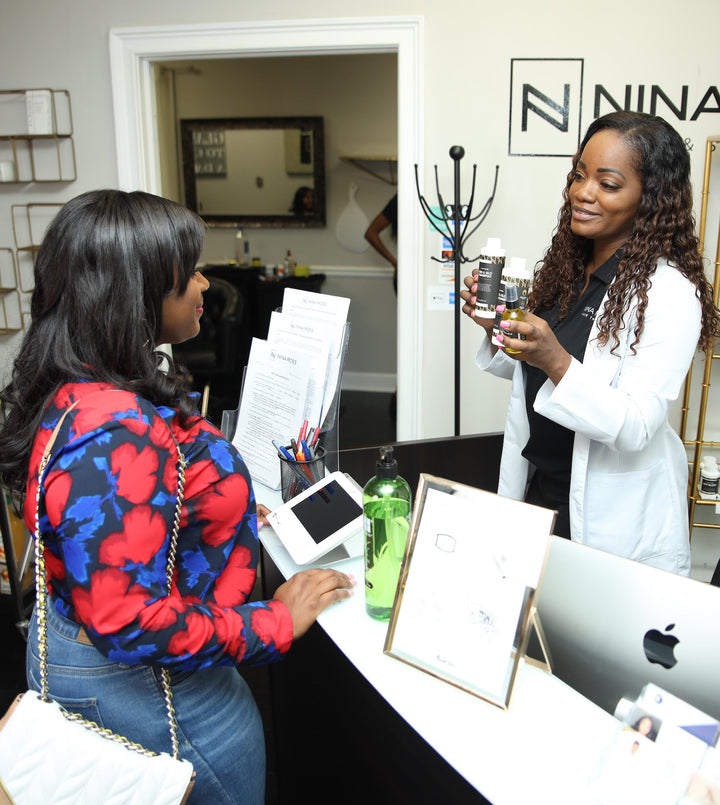Let me tell you about Michelle—yet another client who walked into our Atlanta clinic at her wit's end. She was taking her biotin, using all the right products, but her hair kept getting thinner. When we ran her labs, the answer was staring back at us: her Vitamin D levels were at 18 ng/mL. For reference, optimal for hair growth is 60-80 ng/mL.
And you know what? Michelle's story is the rule, not the exception, for most Black women I see. We're practically designed for Vitamin D deficiency—our beautiful melanin, while protecting us from sun damage, also reduces Vitamin D production by up to 90% compared to lighter skin.
So if you're doing everything "right" but your hair still won't grow, let's talk about what might actually be the missing piece.
Why Vitamin D Is Your Hair's Project Manager
Think of Vitamin D less like a nutrient and more like a project manager for your hair follicles. It's the one standing at the construction site telling the workers when to start building new hair.
Without enough Vitamin D, those follicles basically stay asleep. They might produce weak, thin hairs that barely make it past your scalp before giving up. This isn't just about shedding—it's about your body losing the ability to create strong new hair to replace what you're losing.
The research backs this up—studies show most women with hair loss have significantly low Vitamin D levels. But here's what most articles won't tell you: for Black women, this isn't just a possibility—it's practically our baseline.
The 4 Reasons You're Probably Deficient (And It's Not Your Fault)
1. Your Melanin is Working Against You
Our beautiful skin tone contains more melanin, which acts as a natural sunscreen. While this protects us from UV damage, it also means we need 5-10 times more sun exposure to produce the same amount of Vitamin D as someone with fair skin. Living in Atlanta with our busy indoor lives? Nearly impossible.
2. Your Body Might Be Holding It Hostage
Here's something your doctor probably never mentioned: Vitamin D is fat-soluble. If you're carrying extra weight (and let's be real, many of us are), your body stores Vitamin D in fat tissue instead of letting it circulate to your hair follicles. So you could be taking supplements but your hair never sees the benefits.
3. Your Gut Might Be Stealing It
Conditions like IBS, Crohn's, or even general inflammation—which disproportionately affect Black women—can prevent your intestines from absorbing Vitamin D properly. So even if you're eating enough or supplementing, your body might be flushing it out before it can help your hair.
4. Your "Normal" Lab Results Are Lying
When your doctor says your Vitamin D levels are "normal," they usually mean you're not at risk for bone disease. But for hair growth? The medical "normal" range is a joke. I've seen women with levels of 30 ng/mL get told they're fine, while their hair continues to thin. For optimal hair growth, we want to see levels between 60-80 ng/mL.
Why Just Taking a Supplement Often Isn't Enough
You might be thinking, "I already take Vitamin D!" But here's what I need you to understand:
Most over-the-counter supplements are Vitamin D2 (ergocalciferol), which is poorly absorbed. You need D3 (cholecalciferol). Even then, without the right co-factors like magnesium and Vitamin K2, the D3 can't do its job properly.
This is why we created our Nina Ross Vitamin D3 Soft Gels with these co-factors included—because taking Vitamin D alone is like trying to start a car without the keys.
Our Approach: Testing, Not Guessing
At Nina Ross Hair Therapy, we don't just throw supplements at the problem. Here's how we actually solve Vitamin D-related hair loss:
1. We Run the Right Labs: We check your Vitamin D levels, but we also look at your parathyroid hormone, calcium, and magnesium levels to get the full picture of why you're deficient.
2. We Prescribe Based on Your Numbers: If your levels are at 15 ng/mL, you need a completely different protocol than someone at 35 ng/mL. We create personalized dosing plans that actually move your numbers into the optimal range.
3. We Address the Underlying Cause: Are you deficient because of gut issues? Weight? Pure lack of sun? We find the root cause so the issue doesn’t come back to haunt you again any time soon.
4. We Combine with Advanced Treatments: For women whose hair loss has progressed, we pair Vitamin D optimization with PRP therapy or exosome treatments to strengthen and activate any dormant follicles faster.
The Real Timeline for Seeing Results
If you start addressing a true Vitamin D deficiency today, you might notice that your hair don’t shed as much any longer in just 8-12 weeks. But real, visible regrowth? That typically takes 6-9 months of consistent, optimal levels. This isn't a quick fix—it's about rebuilding your hair's foundation from the ground up.
Tired of Guessing What Your Hair Needs?
If you've been taking random supplements without knowing your actual levels, you're shooting in the dark. Your hair can't thrive on hope and guesswork.
Book your Hair Therapy Evaluation with us today for just $99,











